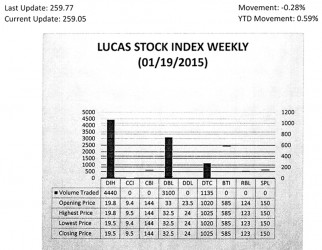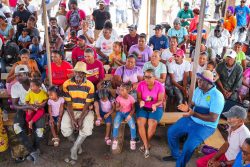The trick
The President of Guyana on Tuesday January 20, 2015 announced May 11, 2015 as the date on which the next elections will occur. The announcement was done without the customary dissolution of parliament which normally accompanies such an announcement. The absence of the mandatory proclamation and the proposed timing of the elections caused Guyanese to surmise rather rapidly that the PPP/C government was playing a game of cat and mouse with them. Prorogation does not end the need for the parliamentary approval of money spent by the government in the new fiscal year. An appropriation bill is still necessary and it could only come from the 10th Parliament.
As such, a popular view has now emerged that the 10th Parliament was being kept alive and will be brought out of prorogation for the purpose of passing a budget after which the government would reschedule the elections at its own convenience. This attitude of the government suggests that the suspension from work has taught the ‘insubordinate’ lawmakers a lesson and they would be compliant in any reconvened parliament for a decision limited to the budget of government’s choice. The trick fooled no one for Guyanese have long come to realize that they should be alert at all times for any subterfuge by the current government. The real motive for the chosen date is yet to be revealed.
The image
 The preceding description actually exemplifies in part what is at stake in the upcoming elections in Guyana given the myriad corrupt and despicable things that have occurred in the country over the past 18 years. The elections are about the value system of our choice. With the social and economic evolution of the country, the image of who we are as Guyanese has changed. We are no longer seen as a most hospitable and generous people.
The preceding description actually exemplifies in part what is at stake in the upcoming elections in Guyana given the myriad corrupt and despicable things that have occurred in the country over the past 18 years. The elections are about the value system of our choice. With the social and economic evolution of the country, the image of who we are as Guyanese has changed. We are no longer seen as a most hospitable and generous people.
The welcome mat at the door does not look the same and the exchange of goods by neighbours is no longer for friendship and social cohesion. It is for money and other favours. The arrival of a visitor to the home no longer automatically stirs activity in the kitchen and induces a trip to the shop for beverages and the cakes if none were in the house. That consumer behaviour has virtually disappeared and in its place has emerged the cellphone call for home delivery or takeout from a wider selection of fast foods with North American and Chinese style and taste. The range of consumer goods has expanded and communication has become more widespread and personalized. The internet and social media have become popular 24-hour third places that link us to each other and make our stories available instantly to billions in the world. Our exports are no longer traditional products but they are not always legal either. The motor car, the cellphone and the computer have been used as weapons against us. Like the gun, they have become lethal in road accidents, robberies and domestic violence.
Behaviour
 The aforementioned economic and social changes have been overshadowed by irrational public policy choices and incomprehensible positions on safety and justice in this country. These behaviours have become so widespread that they show up with regularity in murder cases, domestic violence cases, road accident cases, human trafficking cases and cases of police brutality. In many high-profile cases, perpetrators have been able to walk away freely. The public officials who make these colossal mistakes are rarely ever penalized and often rewarded with promotions or job security. Authorities of other countries have no qualms in using our own injustice to define us as a people and to judge our fitness for entry into their countries.
The aforementioned economic and social changes have been overshadowed by irrational public policy choices and incomprehensible positions on safety and justice in this country. These behaviours have become so widespread that they show up with regularity in murder cases, domestic violence cases, road accident cases, human trafficking cases and cases of police brutality. In many high-profile cases, perpetrators have been able to walk away freely. The public officials who make these colossal mistakes are rarely ever penalized and often rewarded with promotions or job security. Authorities of other countries have no qualms in using our own injustice to define us as a people and to judge our fitness for entry into their countries.
Many of these things pain us, but the pain is often self-inflicted. Many of us prefer to cut our noses to spoil our faces at the voting booth where irrationality often supersedes commonsense. For example, Guyana has experienced economic growth for the past seven years. Yet, that economic growth has not changed the lives of residents of Sophia for the better even though we invite the world each year to see aspects of the Guyana economy on display in that neighbourhood. Our streets, yards and houses flood with almost every rainfall. Billions of dollars have been spent to clean our environment. Yet we cannot breathe clean air when we walk past the municipal markets and the uncovered gutters in the city. We live at the water’s edge and no one has thought of how to save us from the uncontrolled rage of the sea. The Norwegian money bypasses a majority population that dwells a few feet away from the awesome jaws of the Atlantic.
The temptation
The temptation is always there to embrace a value system that does not make our lives better. We often enjoy a symmetry of values as we look at each other across the sales counter. We do it as we waltz across the dance floor and as the flood waters ruin our crops, our furniture and our homes. When we give up our best aspirations in favour of a corrupt value system, we ruin the future for ourselves and our children. For we become poorer with each undelivered public good or service. We become poorer with every substandard public good that destroys the assets that we worked hard to acquire and that we need and cherish. We become poorer with every project with a cost overrun. Our economic losses make us desperate and angry and we hurt each other at home and on the streets. Together, we stand as a people faced with finding ways to feed our children, faced with finding ways to clothe our children, faced with finding ways to house our children, faced with finding ways to educate our children, faced with finding ways to keep our children safe. We would never achieve those ends if we continue to embrace a value system that has no means or intentions of getting us there.
The concern
Why must we be concerned? We must be concerned because the government that we have does not make decisions in our best interest. It makes the decisions in its own interest for how else can you explain the decisions about GuySuCo and the Marriott? The government has defended producing cane at US40 cents per pound and selling it at US$18 cents per pound as helping workers and families. We are supposed to have compassion on our fellow Guyanese and we do. But what about the Marriott? Before this project was started, Guyanese declared that they did not want it. There was therefore no need to build it but the government insisted on having it. The Marriott has now been completed with the use of taxpayers’ money at an estimated cost of US$60 million and with none of those taxpayers getting a job to build it. Having spent our money on a project that was unnecessary and that excluded our workers, the government has decided, on its own accord, to sell US$40 million worth of its assets for US$8 million. To boot, the government has refused to sell those assets to Guyanese. This decision is just like that of GuySuCo where taxpayers’ money does not serve the best interest of all of Guyana. Just like GuySuCo which subsidizes the sugar consumption of foreigners at the expense of Guyanese, the sale of the Marriott at a deep discount subsidizes the investment of foreigners in Guyana at the expense of Guyanese investors. To add insult to injury, the lucky foreign investor will walk away with tax free income while the workers will pay taxes.
One of the most bizarre things about our present value system is the behaviour of the private sector. The private sector has its interests to protect and that is fair. But to benefit from taxpayers’ dollars and then fight against the legitimate interests of taxpayers is incomprehensible. The position of the private sector is most glaring in the hydropower project called Amaila Falls. Like all other Guyanese, that sector of the economy needs cheap electricity. Cheap electricity would enable it to improve its competitive position in the global economy. It would enable it to produce more goods at lower cost and earn larger profits. Such outcomes would enable the private sector to pay its workers better salaries. Instead of standing on the side of workers in demanding the establishment of the Public Procurement Commission (PPC) and showing them that they care, the private sector joined in the most shocking choice of letting cheap electricity go. Then that same private sector has the gumption when workers stand by themselves in strike action to fight for their rights to chastise them for looking after their own interests.
This writer has an abiding faith in the emerging willingness of Guyanese to think for themselves and to free themselves from a value system that has failed and embarrassed them. We want to be known as a people whose ideas are embraced and not demonized. We want to be known as a people who would lift each other up rather than tear each other down. We want to be known as a people who cooperate and trust in each other rather than be suspicious and separated from each other. These are the working tools of humanity that enable us to bring out the best in ourselves. They are the pillars upon which we can build safe homes and communities for our children; earn better incomes for ourselves and family; build a business to secure the future. These are ambitions waiting to burst open if given the chance for they have been restrained by the irrational decisions of the government, the delivery of substandard public goods, the pursuit of economic and social policies that keep wicked and corrupt police, contractors and public officials on the job.
The leaders
To get there, we have to see in our leaders the persons who share our vision of who we want to be. They cannot be about values that deride our sensitivities and morality. They must be about that spirit of unity that makes us stronger and capable of expanding our social and economic life. It must be a decision that shuns the cuddling of corruption and conflicts of interest and promotes and supports individual ingenuity and entrepreneurship in a spirit of economic competition and an environment of social cohesion. It must be a decision about all of us.
LUCAS STOCK INDEX
The Lucas Stock Index (LSI) declined 0.28 per cent in trading during the third period of January 2015. The stocks of three companies were traded with 8,675 shares changing hands. There was one Climber and two Tumblers. The value of the stocks of Demerara Tobacco Company rose 0.48 per cent on the sale of 1,135 shares. The value of the stocks of Banks DIH (DIH) fell 1.52 percent on the sale of 4,440 shares and the Demerara Bank Limited (DBL) fell 1.52 per cent on the sale of 3,100 shares.







